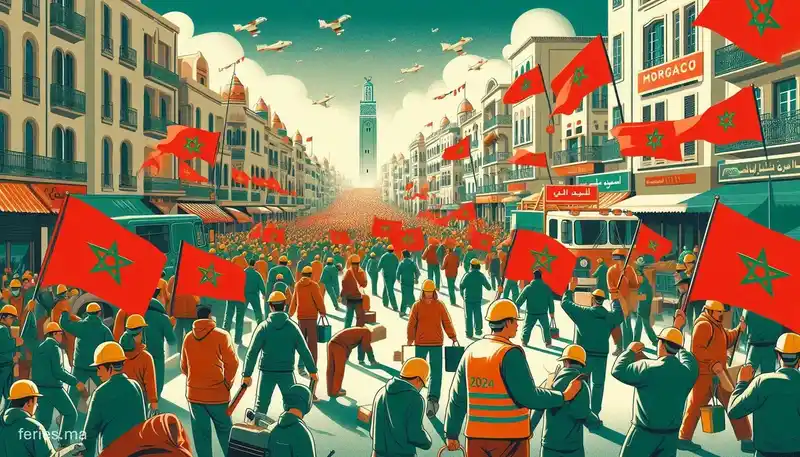Morocco: Labor Day 2024
International Workers' Day, now Labor Day, is an annual international holiday celebrating workers. It is the occasion for major demonstrations of the labor movement.

Labor Day in Morocco 2024: A Celebration of Workers’ Rights and Achievements
Labor Day, or Fête du Travail in Morocco, is celebrated annually on May 1st. It is a day dedicated to honoring the achievements of the working class and emphasizing the importance of workers’ rights. In 2024, this occasion holds particular significance as Morocco continues to navigate economic and social challenges while fostering growth, labor reforms, and inclusivity in the workforce.
Festivities and Events on Labor Day
On May 1st, the streets of Morocco’s major cities, such as Casablanca, Rabat, and Marrakech, are often filled with a variety of celebrations and demonstrations organized by trade unions and worker organizations. These unions—representing different sectors, from agriculture to manufacturing and services—use this day to march peacefully and voice their concerns about working conditions, wages, and labor reforms.
In 2024, the celebration will likely include:
Peaceful Marches: As in previous years, trade unions will lead peaceful marches in the major cities. These marches are an opportunity for workers to demonstrate unity, present their demands to the government, and engage in dialogue around issues like salary increases, job security, and social protections.
Family Gatherings: For many Moroccans, Labor Day is also a time to spend with family. Workers often use this public holiday to relax, share meals, and reconnect with their loved ones.
Labor Day festivities blend the seriousness of political demands with the joy of celebrating the hard work and resilience of Moroccan workers across various industries.
Official Holiday and Workers’ Rights
In Morocco, Labor Day is an official public holiday, and workers are granted a day off with full pay. Businesses, schools, and government offices remain closed, giving workers a break from their daily routines to participate in the day’s events or rest.
Morocco has a rich history of labor movements dating back to the 20th century, and Labor Day stands as a testament to the struggles and successes of workers in gaining rights such as regulated working hours, minimum wage laws, and improved working conditions. The official holiday is recognized by the government as a time to reflect on these achievements and the ongoing need for reforms.
In 2024, workers are still facing significant challenges. The unemployment rate, especially among youth, continues to be a concern, as do issues related to informal work and labor protections in certain industries. However, Labor Day is a time to acknowledge progress, celebrate hard-earned rights, and push for continued reforms to ensure dignity and fairness for all workers.
The Millennium Generation’s Perspective on Labor Day
The Millennial generation (born between 1981 and 1996) in Morocco offers a unique perspective on Labor Day, shaped by their experiences with globalization, technology, and changing economic conditions. Many millennials in the country have grown up during a time of rapid transformation, where education, digital innovation, and entrepreneurship have become central to the economy. Yet, this generation also faces pressing challenges, particularly in the labor market.
For many millennials, Labor Day is seen as both a symbolic day of solidarity with the workforce and a call to action for addressing structural issues like unemployment and underemployment. With a large number of graduates entering the job market each year, competition is fierce, and many find themselves either working jobs that do not match their qualifications or facing prolonged job searches. Furthermore, millennials are more likely to work in the gig economy, a growing sector in Morocco, which often lacks the same protections and benefits as traditional employment.
This generation is also pushing for greater flexibility in the workplace, such as remote work options and work-life balance, reflecting global trends in modern labor movements. While traditional sectors like agriculture and manufacturing remain vital, young Moroccans are increasingly drawn to technology, startups, and creative industries, where they seek not only economic opportunity but also personal fulfillment.
Labor Day for this generation is not just about acknowledging past labor victories but also about envisioning a future that aligns with their aspirations for entrepreneurial freedom, innovation, and greater inclusivity in the labor market. Millennials advocate for updated labor policies that reflect the changing dynamics of work, such as ensuring protections for freelance and temporary workers and fostering conditions that support youth employment and professional development.
Conclusion
Labor Day in Morocco remains an important occasion for celebrating the achievements of workers, fostering dialogue between trade unions, the government, and the public, and advocating for continued reforms. As Morocco moves forward in 2024, the day serves as both a reflection on the progress made and a reminder of the challenges that still face its workforce—particularly the country’s youth. Whether through marches, cultural events, or family gatherings, Labor Day continues to resonate as a powerful symbol of solidarity and hope for a better future for all workers in Morocco.